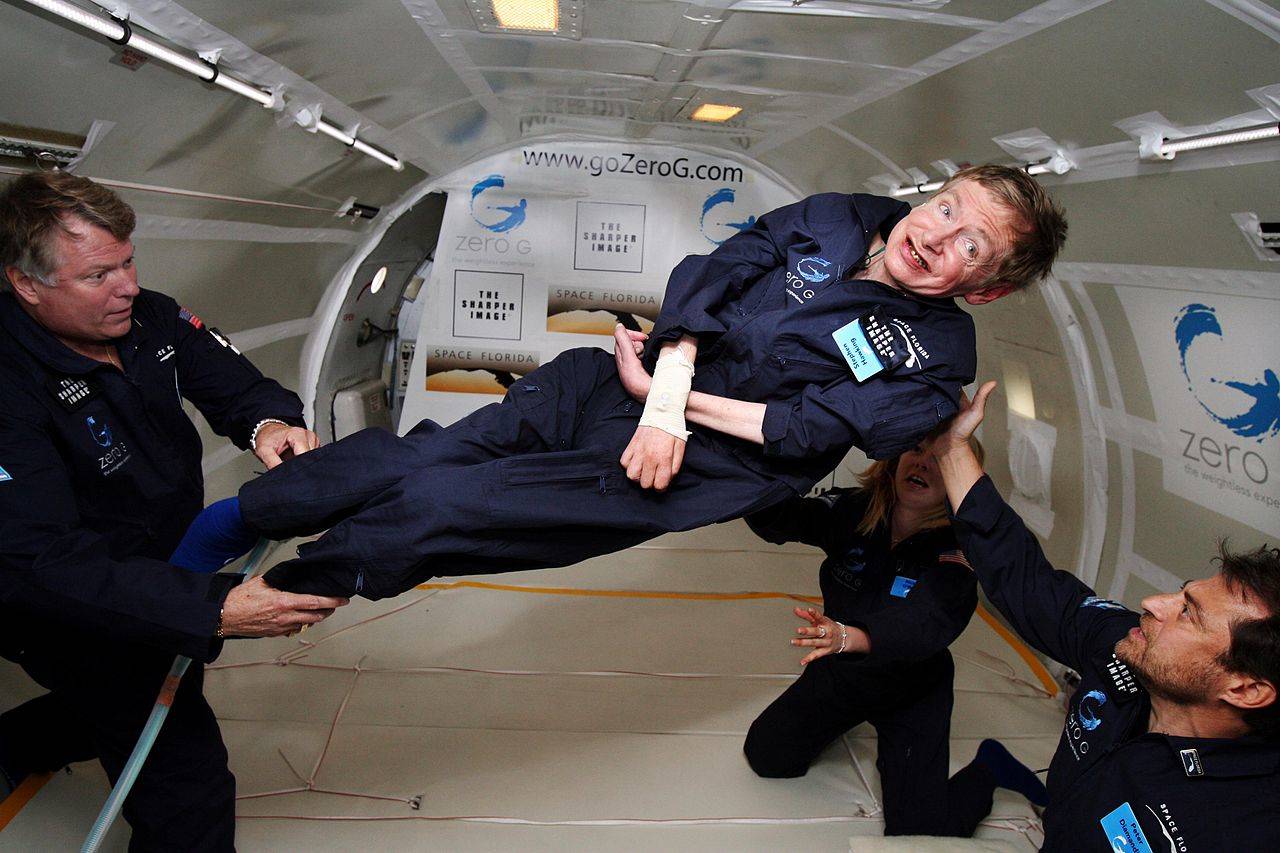Advice to Physicists: “Shut Up and Do Physics”
Well-known public intellectuals sometimes stray outside their silos of expertise, showing questionable judgment about, for example, AIEver wonder why actor Kevin Costner testified in front of Congress on the topic of oil spills, as did Ben Affleck on a children’s project, and quizmaster Bob Barker on the Captive Elephant Accident Prevention Act? Many people, including some in Congress and the media, apparently equate celebrity in one area to across-the-board genius in everything.
Laura Ingraham disagrees; she has told clueless pontificating music celebrities to Shut Up and Sing. Similarly, Ricky Gervais recently informed celebrity loudmouths, “You know nothing about the real world. Most of you spent less time in school than Greta Thunberg.”

Great scientists risk similar overreach when they become celebrities. Consider, for example, Stephen Hawking’s fears of AI. Hawking (1942–2018), pictured above testing reduced gravity, was a genius in cosmology. With fellow genius Roger Penrose, he formulated the Penrose–Hawking singularity theorems, applying general relativity so as to understand black holes better. But artificial intelligence scared Hawking :
He told the BBC: “The development of full artificial intelligence could spell the end of the human race”…
“It would take off on its own, and re-design itself at an ever increasing rate,” he said.
“Humans, who are limited by slow biological evolution, couldn’t compete, and would be superseded.”
Rory Cellan-Jones, “Stephen Hawking warns artificial intelligence could end mankind” at BBC News (December 2, 2014)
Despite his gifts in cosmology, Hawking was outside of his silo of expertise here. He assumes, for example, that AI is creative. Using the measure of Bringsjord’s Lovelace test, AI has yet to be creative.
Hawking’s concern was all the more curious in light of his earlier abandonment of an ultimate Theory of Everything that would unify the physics of the universe in a nicely wrapped interconnected set of equations. He changed his mind about the viability of that project on account of Kurt Gödel’s theorems on incompleteness and inconsistency. No matter how much physicists discovered, he concluded, there would still be more to learn.
Remarkably, the distance between Gödel’s work and the limitations of computer creativity is not far. Alan Turing, the father of modern computer science, built on Gödel’s thesis, showing that some problems are nonalgorithmic and therefore cannot be captured by computer code. Evidence is growing that many human attributes, such as creativity, likewise cannot be captured by computer code.
Penrose, Hawking’s co-author on black hole physics, recognized this connection and wrote about it. His book The Emperor’s New Mind (1989) wonderfully links Gödel to Turing and establishes the noncomputable nature of creativity. Penrose posits that the noncomputable characteristics of human thinking spring from quantum effects in microtubules in the brain. The quantum collapse of a wave function to a deterministic state, reasoned Penrose, is nonalgorithmic and thus might be the source of noncomputable creativity.
Hawking seems not to have considered Penrose’s work when he offered his scary prediction about a dystopian AI future. One would not say to a man of his intellectual stature, “Shut up and do physics!” We can say, however, that Hawking had the intellect to learn about Penrose’s insight into computers and AI via Gödel. But he didn’t.
Note: The advice to “Shut up and… ” did not originate with Laura Ingraham but with solid state physicist David Mermin, in response to the many speculations around quantum mechanics: “If I were forced to sum up in one sentence what the Copenhagen interpretation says to me, it would be ‘Shut up and calculate!’” See N. David Mermin, “What’s wrong with this pillow?”, Physics Today, April 1989.
A number of public intellectuals in science who are not computer experts have prophesied an AI takeover. Here are a couple more from our files:
Why Richard Dawkins thinks AI may replace us. He likes the idea because it is consistent with his naturalist philosophy.
Noted astronomer envisions cyborgs on Mars. Martin Rees thinks of this “post-human evolution” as going beyond Darwin to “secular intelligent design.”
Also, Henry Kissinger, Elon Musk, and Nick Bostrom share the concern. As does cosmologist Max Tegmark.
